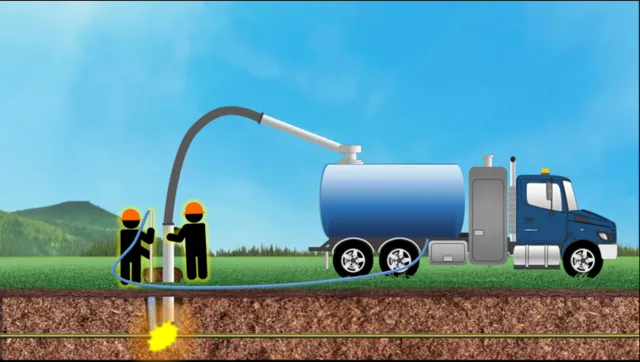Safety and Hydro Excavation
Safety should always come first.
Posted 14:37 August 19, 2024
Last Updated 14:37 August 19, 2024

Safety and hydro excavation is a critical topic in modern construction and infrastructure maintenance. Hydro excavation, also known as hydro-vacuum excavation, is a non-destructive method of digging that uses high-pressure water to break up soil, which is then vacuumed into a debris tank. This technique is particularly valuable for its precision, safety, and minimal environmental impact compared to traditional digging methods like mechanical excavation.
The primary advantage of hydro excavation lies in its ability to safely expose underground utilities without causing damage. Traditional digging methods, such as using backhoes or other heavy machinery, can be hazardous when working near sensitive underground infrastructure like gas lines, water pipes, and electrical cables. Accidental strikes to these utilities not only pose significant safety risks to workers and the surrounding community but also result in costly repairs and project delays. Hydro excavation mitigates these risks by allowing operators to work with a high degree of accuracy. The water used in the process is carefully directed to break up the soil around the utilities, which are then safely uncovered without direct contact.
Safety is at the forefront of hydro excavation operations. The method significantly reduces the risk of cave-ins and trench collapses, which are common hazards in traditional excavation methods. The use of water and vacuum technology minimizes the need for heavy machinery in the digging process, reducing the likelihood of accidents related to equipment failure or operator error. Moreover, hydro excavation is less physically demanding for workers, as it eliminates the need for manual digging in hazardous conditions. This not only improves worker safety but also increases productivity by reducing the time and effort required to complete excavation tasks.
Environmental safety is another key consideration in hydro excavation. Traditional excavation methods often involve the displacement of large amounts of soil, which can lead to erosion, sedimentation, and disruption of natural habitats. In contrast, hydro excavation is a more controlled process that minimizes environmental disturbance. The soil and debris removed during the process are contained within the vacuum system, preventing them from contaminating nearby water sources or ecosystems. Additionally, because hydro excavation is more precise, there is less need for site restoration, further reducing the environmental impact.
Despite its many advantages, hydro excavation is not without challenges. The equipment and technology required for hydro excavation can be expensive, which may increase project costs, especially for smaller companies. The process also requires a reliable water source, and in colder climates, the water used can freeze, complicating operations. However, these challenges are often outweighed by the safety benefits and overall efficiency of the method.
In conclusion, hydro excavation is a safer, more precise, and environmentally friendly alternative to traditional digging methods. By minimizing the risk of damage to underground utilities, reducing the potential for workplace accidents, and limiting environmental impact, hydro excavation represents a significant advancement in excavation technology. As infrastructure projects continue to evolve and the demand for safer, more efficient construction practices grows, hydro excavation is likely to become an increasingly integral part of the industry.
Contact Hole Hogz today to discuss your upcoming excavation project. We service Las Vegas, Henderson, Boulder City, and most parts of Clark County Nevada. We handle commercial, municipal, and residential accounts.
